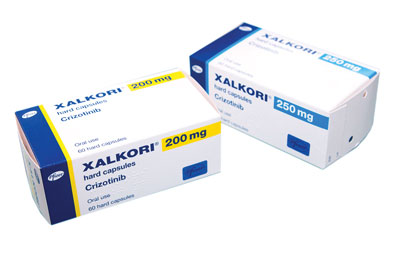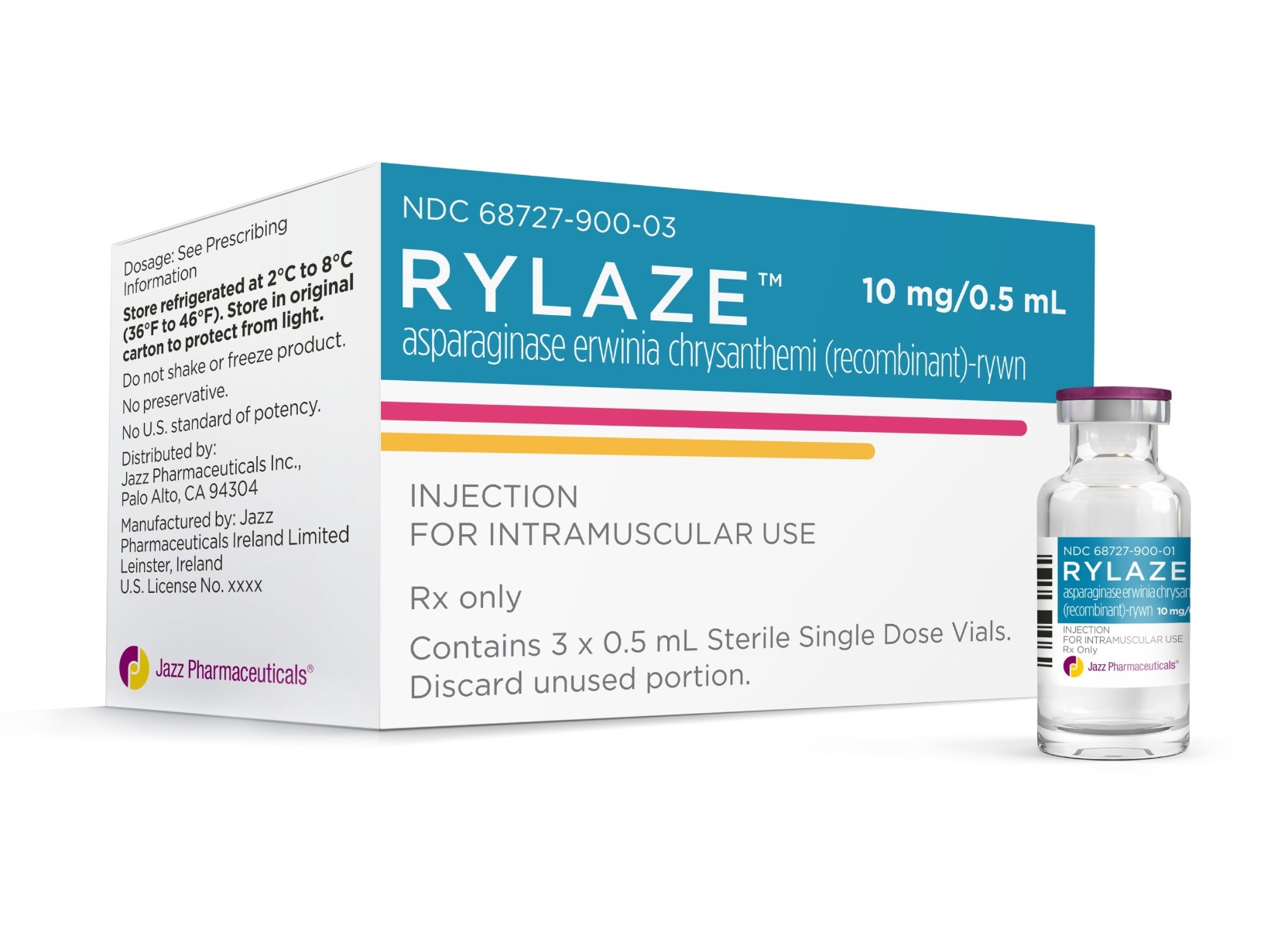Xalkori (crizotinib) vs Rylaze (asparaginase erwinia chrysanthemi (recombinant)-rywn)
Xalkori (crizotinib) vs Rylaze (asparaginase erwinia chrysanthemi (recombinant)-rywn)
Xalkori (crizotinib) is a targeted therapy used to treat certain types of non-small cell lung cancer (NSCLC) that are positive for anaplastic lymphoma kinase (ALK) or ROS1 mutations, functioning by inhibiting the activity of these proteins to slow down tumor growth. Rylaze (asparaginase erwinia chrysanthemi (recombinant)-rywn), on the other hand, is an enzyme therapy used as part of a multi-agent chemotherapeutic regimen for patients with acute lymphoblastic leukemia (ALL) who have developed hypersensitivity to E. coli-derived asparaginase. The choice between Xalkori and Rylaze would depend on the specific type of cancer a patient has, as they are used to treat different conditions and work through distinct mechanisms of action.
Difference between Xalkori and Rylaze
| Metric | Xalkori (crizotinib) | Rylaze (asparaginase erwinia chrysanthemi (recombinant)-rywn) |
|---|---|---|
| Generic name | Crizotinib | Asparaginase erwinia chrysanthemi (recombinant)-rywn |
| Indications | Treatment of non-small cell lung cancer (NSCLC) with ALK or ROS1 genetic alterations | Treatment of acute lymphoblastic leukemia (ALL) in patients who have developed hypersensitivity to E. coli-derived asparaginase |
| Mechanism of action | ALK and ROS1 tyrosine kinase inhibitor | Enzyme that catalyzes the deamination of asparagine to aspartic acid, reducing asparagine levels and inhibiting protein synthesis in leukemic cells |
| Brand names | Xalkori | Rylaze |
| Administrative route | Oral | Intramuscular injection |
| Side effects | Visual disorders, gastrointestinal effects, edema, elevated transaminases, fatigue, decreased appetite | Allergic reactions, pancreatitis, glucose intolerance, thrombosis, bleeding, liver toxicity |
| Contraindications | Hepatic impairment, concomitant use of strong CYP3A inhibitors or inducers | History of serious pancreatitis, serious thrombosis, serious hemorrhagic events with previous L-asparaginase therapy |
| Drug class | Tyrosine kinase inhibitor | Antineoplastic enzyme |
| Manufacturer | Pfizer | Jazz Pharmaceuticals |
Efficacy
Xalkori (Crizotinib) Efficacy in Treating Lymphoma
Xalkori (crizotinib) is a medication primarily known for its role in treating non-small cell lung cancer (NSCLC) that is anaplastic lymphoma kinase (ALK)-positive. However, its efficacy in treating lymphoma, specifically ALK-positive anaplastic large cell lymphoma (ALCL), has been a subject of clinical interest. ALCL is a subtype of non-Hodgkin lymphoma, and patients with the ALK-positive form may benefit from treatment with crizotinib. Clinical trials have demonstrated that crizotinib can induce responses in relapsed or refractory ALK-positive ALCL, suggesting its potential utility in this setting. However, it is important to note that the use of crizotinib for lymphoma may be considered off-label, as its primary indication is for NSCLC.
The efficacy of crizotinib in lymphoma is attributed to its mechanism of action as an ALK inhibitor. By targeting the aberrant ALK fusion proteins that drive the growth of ALK-positive tumors, crizotinib can halt the progression of the disease. Studies have shown that crizotinib can achieve significant tumor shrinkage and prolonged progression-free survival in some patients with ALK-positive ALCL. Nevertheless, the response to crizotinib can vary, and not all patients may experience the same level of benefit.
Rylaze (Asparaginase Erwinia Chrysanthemi (recombinant)-rywn) Efficacy in Treating Lymphoma
Rylaze, also known as asparaginase erwinia chrysanthemi (recombinant)-rywn, is an asparagine-specific enzyme used in the treatment of acute lymphoblastic leukemia (ALL). Its efficacy in treating lymphoma, specifically ALL, is well-documented. Rylaze is designed to address the hypersensitivity reactions that some patients develop to E. coli-derived asparaginase, which is commonly used in ALL treatment protocols. It works by depleting the amino acid asparagine, which leukemic cells are unable to synthesize in sufficient quantities, thereby inhibiting their growth and survival.
The use of Rylaze in lymphoma is specific to ALL, where it has been shown to be effective when used as a component of a multi-agent chemotherapeutic regimen. Clinical studies have demonstrated that Rylaze can maintain asparaginase activity in patients with ALL who are hypersensitive to E. coli-derived asparaginase. This ensures that patients can complete their prescribed treatment regimen, which is critical for achieving the best possible outcomes in ALL. The use of Rylaze in other types of lymphoma has not been established and is not part of standard treatment protocols.
Regulatory Agency Approvals
Xalkori
-
European Medical Agency (EMA), European Union

-
Food and Drug Administration (FDA), USA

-
Health Canada

-
Pharmaceuticals and Medical Devices Agency (PMDA), Japan

-
Therapeutic Goods Administration (TGA), Australia

Rylaze
-
Food and Drug Administration (FDA), USA

Access Xalkori or Rylaze today
If Xalkori or Rylaze are not approved or available in your country (e.g. due to supply issues), you can access them via Everyone.org.
How it works

Make an enquiry
Choose the medicine you want to buy, answer a couple of questions, and upload your prescription to speed things up. We’ll get back to you within 24 hours.


Make an enquiry
Choose the medicine you want to buy, answer a couple of questions, and upload your prescription to speed things up. We’ll get back to you within 24 hours.


Breeze through the paperwork
We'll guide you through the required documents for importing unapproved medicine, ensuring you have all the necessary information.


Get a personalized quote
We’ll prepare a quote for you, including medicine costs and any shipping, administrative, or import fees that may apply.


Receive your medicine
Accept the quote and we’ll handle the rest - sourcing and safely delivering your medicine.

Some text on this page has been automatically generated. Speak to your physician before you start a new treatment or medication.
Let's talk
If you have any questions, call us or send us a message through WhatsApp or email:
Contact us




